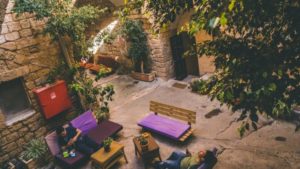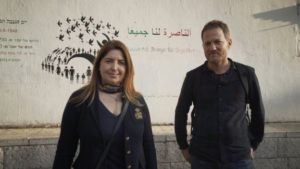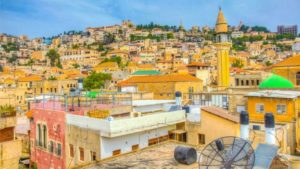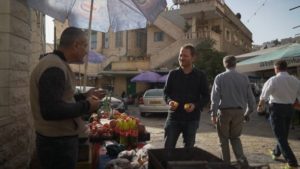 Crossing Divides: The hostel promoting tourism to ease Israel’s tensions
Crossing Divides: The hostel promoting tourism to ease Israel’s tensions
In 2005, a hostel in the old city of Nazareth opened its doors amid a swirl of rumour, gossip and accusations.
The 60-bed dwelling, in a 200-year-old Arab mansion, was run by an unlikely pair: an Israeli Arab woman and an Israeli Jewish man.
But not only was the partnership against the odds, Fauzi Azar Inn opened in an area that had been abandoned by even its own residents. The winding cobbled alleyways were home to graffitied doors, shuttered shops, and drug dealers.
“When I first heard about this hostel opening, I thought wow… this is unusual,” says Alon Gelbman, a professor of tourism management at Kinneret College in Galilee. “But it became a success story quite fast.”
Once the home of the Azar family, the inn’s marble floors, hand-painted ceilings and 19th Century arch-framed courtyards had been left to decay.
 “After my grandmother died, the family never really went there,” says Suraida Shomar Nasser, who co-founded the hostel with Maoz Inon.
“After my grandmother died, the family never really went there,” says Suraida Shomar Nasser, who co-founded the hostel with Maoz Inon.
Having returned from backpacking around the world, and seeing how hostels could become the centre of a community, Maoz had decided he wanted to open his own. On visiting Nazareth – Israel’s largest Arab city, with Muslims making up 70% of its 77,000-strong population – he came across Fauzi Azar.
“I walked in this small door and was really shocked,” recalls Maoz. “I could see the potential.”
He approached Suraida, who initially was hostile to the idea. “I thought he was crazy,” she says. “I told Maoz to forget about it, look for another family. He asked me why and I said ‘because you’re Jewish, I cannot work with you’.”
Divisions run deep. Suraida’s grandfather, who gave the hostel its name, had fought in the 1948 Arab-Israeli war. But Maoz persisted, and eventually persuaded Suraida’s mother, who saw an opportunity.
“She knew she wasn’t going to get any money from me,” Maoz says, “but she just saw something in me I guess.”

Nazareth’s old city draws visitors to its large market and to Christian sites
Locals viewed the partnership with suspicion, and accused Suraida and her family of “conspiring” with Maoz to “Judaise” the city, in northern Israel.
“It was not easy,” says Suraida. “But we decided OK, we will try.”
After gruelling and lengthy renovations the hostel opened its doors to the public, and the tourists started to come.
“We definitely had some hard times,” Maoz says. “But now we see the whole old city has changed and there are so many shops and cafes and other hostels that have opened up because we have been here. I worked hard to meet everybody in the community, so they knew that I was here as a friend, and to help.”
Despite no longer living in Nazareth, Maoz still knows most of the shopkeepers by name, and is credited with helping to heal tensions and bring Jewish visitors into the city.

“It is because of Maoz that we are always so busy now,” says Jarjoura Kanaza, who runs the Elbabour spice store with his brother. “He came to our old city and he brought it back to life. People were so suspicious of him, but I saw something good. Really, he has done so much for us.”
A decade after the inn opened, Prof Gelbman decided to use Fauzi Azar as a case study for his paper on how tourism could be used to heal conflict and divided communities.
“The partnership became a symbol,” says Prof Gelbman. “Because we don’t see too much cooperation between Jews and Arabs.
“And the question we set out to answer was not ‘can peace promote tourism?’, but instead, ‘can tourism promote peace?’ Can we use tourism to encourage more peaceful and better relationships in communities?
“Can we use the fact that people are meeting each other, talking, becoming more familiar with other communities, to start a change, bottom-up?”

